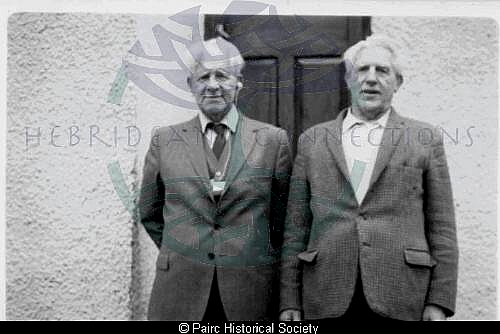45972: Religious Observance in Lewis
By Murdo Macleod, Murchadh Dhomhnaill Chalum, 2 Kershader.
Religion played a prominent part in my life as a boy and later as a young man.
Perhaps I should explain what the religious observations of the time were, especially as there seems to be many people, then and now, who felt capable of criticising the Lewisman and his religion without being fully acquainted with the facts.
Broadly speaking, Lewis people, through their attitude to religion, could be divided into three classes:
Class I: The communicants, all holding strongly to the teachings of Calvin and Knox , who, in addition, were expected to be able to pray in public, discuss at the Communion Men’s Day service biblical texts without prior notice and, if necessary, to conduct a religious service. All this they could do with decorum, with simplicity and with knowledge.
Class II: They consisted of those holding similar views, but, who for various reasons, did not feel qualified to sit at the Lord’s table. Their attendance at divine worship was always assured and their observance of the Commandments and the biblical law was constant and unvarying.
Class III: These were the smallest section who were careless of their language and way of life.
These three classes were found in various and varying numbers in every village in the Island, though I should say that in overall, Class II were the most predominant and Class III, the least frequent.
Though all in Class II did not always fully agree with the very austere attitudes of Class I as it was, one of them expressed his views in the well-known verse:
Saoilidh fear mu bhios e crabhach
Gur e gul is bron is fearr dhiabh
‘S gur e gaoth na h-osainn laidair
Soirbheus fabharach gu gloir.
If we believe most of our writers, the communicants of Lewis are unable to see life except through the spectacles of eternal damnation, and when not engaging in Pharisaical condemnation of others and other religions, they are constantly giving vent to expressions such as "Och, och" and "Obh, obh". Such certainly was not my experience of the old folk in Lewis. Of course, there were some whose demeanour was morose and whose face seldom brightened into a smile, but they were to be found in all classes. Many of our elders could see and report on humorous occurrences with as much relish as would a man uncommitted to Christianity.
Could it be that those critics of the intolerant Lewis attitude are those that could not care less about their neighbours or that of the permissive society of the present day, where Calvinism and Puritanism are dirty words and four-letter obscene words are in common use by many of those regarded as our mentors are the direct descendants of the tolerance of the years from the end of the First World War?
After being discharged from the Navy in August 1918 until I left home again in April 1919, I was much in their company and treated by them as a grownup. I had the opportunity of appreciating their great worth and to compare them with people from all parts of the country.
Of course, everyone must remember that as crofter fishermen, their livelihood depended upon doing their duty as one of a team. Conditions are different where the crofter/weaver can fence his holding and can please himself as to when and how he works his loom.
Comunn Eachdraidh na Pairc 1991
Details
- Record Type:
- Story, Report or Tradition
- Type Of Story Report Tradition:
- Interview
- Record Maintained by:
- CEP
